Coding Bootcamp vs. College Degree for a Career in Tech
Considering a coding bootcamp certificate? Explore the pros and cons of a coding bootcamp vs. university: curriculum, career support, and more.

The tech industry is booming, and the demand for skilled professionals is higher than ever. The U.S. Bureau of Labor Statistics projects an 11% growth in computer and IT jobs from 2019 to 2029, well above the average for all occupations. This surge raises an important question: Should aspiring tech professionals choose a traditional college degree in computer science or a coding bootcamp?
Both coding bootcamp certificates and computer science degrees offer strong paths to high-paying tech careers. A study from Switchup found nearly identical employment rates at major tech companies for computer science graduates (6.60%) and bootcamp alumni (6.03%). Furthermore, an Indeed Survey revealed that 72% of employers believe bootcamp graduates are just as prepared for their roles as candidates with degrees.
With these insights in mind, this article will guide you through both educational paths in detail. It will give you a clear understanding of their pros and cons before you make a decision about your future.
Overview of Coding Bootcamps
A coding bootcamp is an intensive, short-term course designed to equip students with the skills needed to begin a career in tech. These programs focus on practical, hands-on learning, ensuring that bootcamp students are job-ready upon completion.
Coding bootcamps emerged in the early 2010s as a response to the tech industry's growing need for skilled developers. They offered an alternative to traditional four-year degrees, providing a faster and more affordable to a tech career. Over time, bootcamps have expanded to cover specializations like web development, data science, and cybersecurity.
Bootcamps typically last several months and are known for their rigorous and immersive nature. The curriculum focuses on current industry needs, including coding languages and frameworks like JavaScript, Python, and Ruby on Rails. Teaching methods emphasize project-based learning, real-world applications, and mentorship. Many bootcamp graduates start earning a salary in a year or less.
Bootcamps are categorized by the required time commitment and instruction type:
- Full-time: Intensive programs that require a full-time commitment
- Part-time: Designed for those who need to balance learning with other responsibilities
- Online: Flexible, remote learning options
- In-person: Traditional classroom settings with face-to-face instruction
Overview of College Degrees
For a coding career, you can pursue a degree in computer science, information technology, or computer programming. These academic programs offer a comprehensive education in computing principles and practices.
The academic discipline of computer science began in the mid-20th century, evolving from mathematics and electrical engineering. Since then, it has grown into a dynamic field that includes various sub-disciplines like artificial intelligence, software engineering, and cybersecurity.
Undergraduate computer science programs last two to four years. They cover core subjects such as algorithms, data structures, and computer architecture. They also offer elective courses for specialization and opportunities for research and internships.
Types of degrees:
- Associate Degree: A two-year program that provides foundational knowledge
- Bachelor's Degree: Four-year studies offering a comprehensive education and more job opportunities
- Master's Degree: An advanced degree focusing on specialization and research
- Ph.D.: A research-focused degree for those pursuing academic or highly specialized industry roles
Comparing Coding Bootcamps vs Degrees
Time Commitment and Flexibility
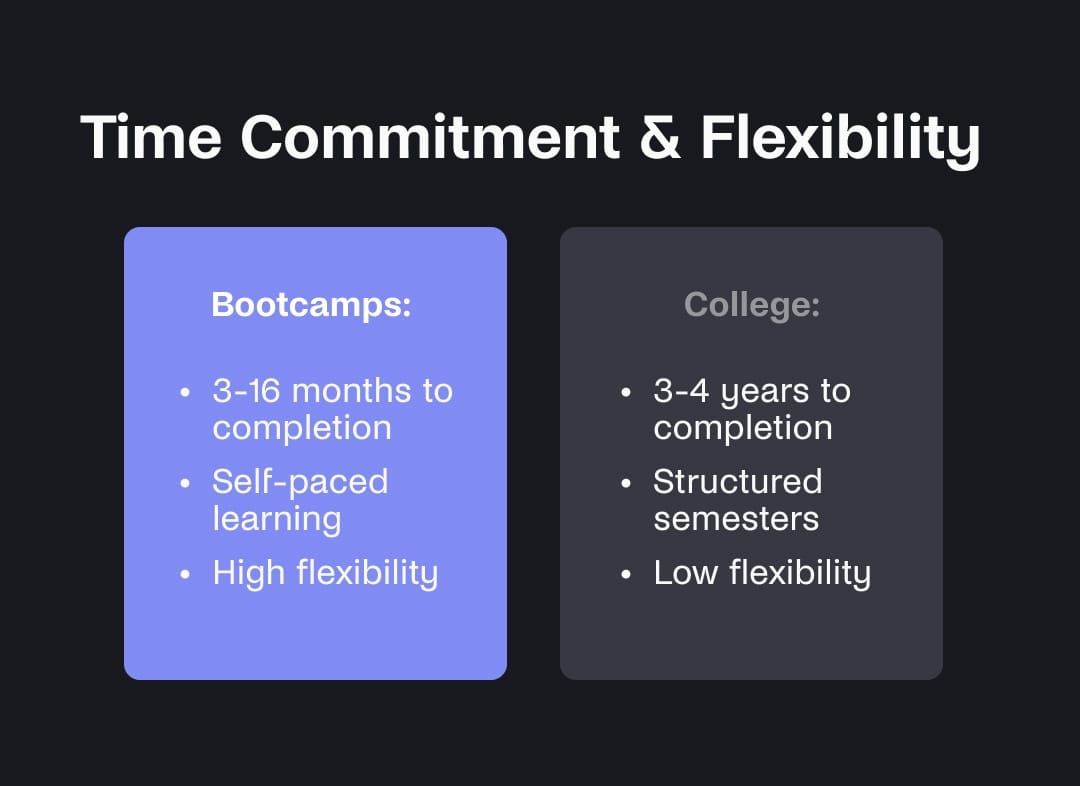
Coding Bootcamps:
Coding bootcamps are designed for efficiency and offer an intensive, immersive experience. These programs may run from 3 months to as much as 16 months depending on their scope. You'll dive straight into coding, often spending over 20 hours a week on coursework. The various formats, including full-time, part-time, in-person, and online coding bootcamps, make them accessible for people with different schedules and commitments.
This flexibility is perfect for career changers or those looking to quickly transition into the tech industry. The fast-paced nature ensures you can start applying for jobs in a matter of months, not years.
Some coding bootcamps offer self-paced courses, allowing you to complete coursework on your own schedule. This is ideal for balancing work, family, or other commitments while advancing your education.
University Programs:
A computer science degree from a university takes a more traditional route, usually requiring three to four years to complete. The schedule is less flexible, following a fixed academic calendar with mandatory classes and semester breaks. Most programs are still classroom-based, although some universities offer online courses.
This longer duration allows for a more comprehensive educational experience, including time for internships, research projects, and extracurricular activities. A university program is better for those seeking a thorough, well-rounded education and a full college experience. However, it's worth noting that it takes up to four years before graduates start earning a salary.
Comparison:
Choosing between the two depends on how soon you want to enter the job market and how you balance other commitments. Bootcamps offer speed and flexibility, ideal for those eager to dive into the workforce. Self-paced learning adds another layer of flexibility, catering to those who need to fit education into a busy schedule. University degree programs require a longer time investment but provide a structured, in-depth education, laying a solid foundation for long-term career growth.
Curriculum and Skills
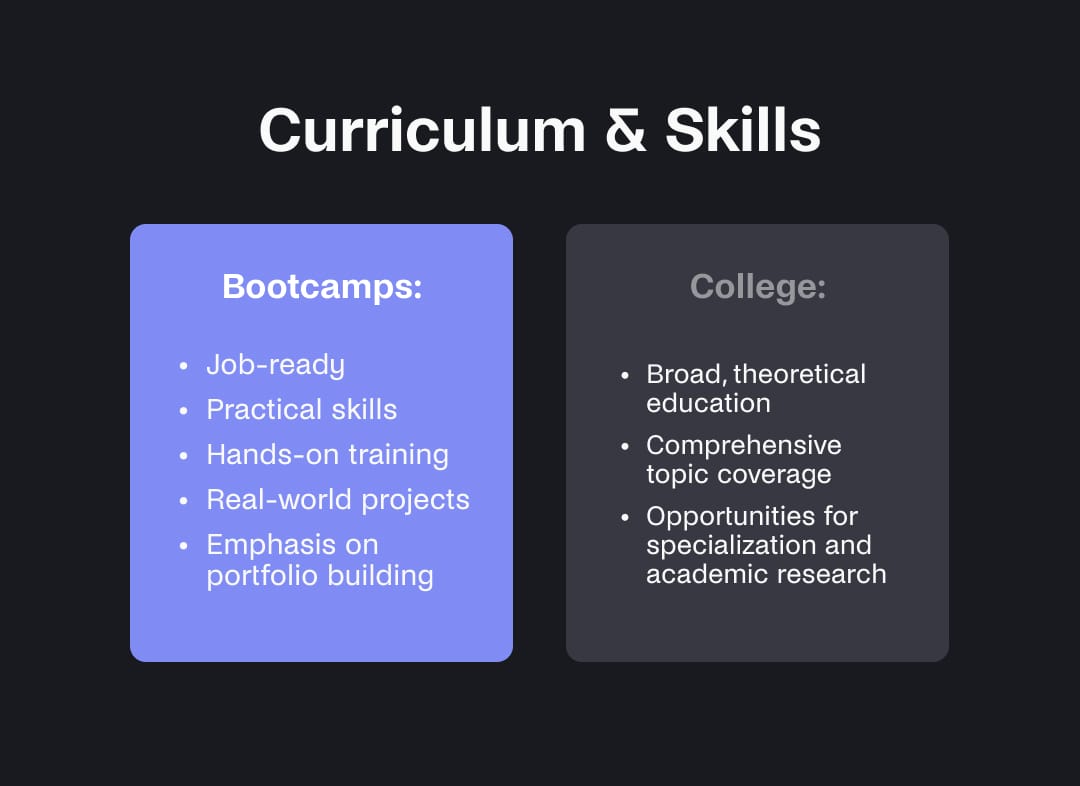
Coding Bootcamps:
Bootcamp curriculums are laser-focused on job-ready skills. Attending a coding bootcamp ensures you'll learn the coding languages and tools that employers are looking for. The hands-on, project-based approach means you'll create real-world applications, building a portfolio to showcase to potential employers.
The skills a bootcamp teaches depend on its focus. Students can choose from various paths, including software development, cybersecurity, web development, or data analytics.
Bootcamps constantly update their curriculum based on industry trends, so you'll likely learn cutting-edge technologies. This practical training aims to make you an attractive candidate for immediate employment.
University Programs:
University programs offer broader, more theoretical computer science courses. While you'll practice coding skills, there's also a strong emphasis on computer science theory and research. You'll study algorithms, data structures, and systems architecture, and you'll also take general education credits in subjects like English, math, science, business, and history.
Universities provide opportunities for specializations, such as AI engineer and software developer. Academic research opportunities allow you to explore and contribute to cutting-edge developments in the field.
This deep, comprehensive knowledge will benefit long-term career growth, especially if you're considering roles that require a solid theoretical background or further education, like a master's or Ph.D.
Comparison:
Coding bootcamps and computer science degrees often cover some of the same educational content. The difference is in the depth and breadth. You'll get practical, job-ready skills from a bootcamp, while computer science curriculums offer a thorough understanding of computer systems and the theory behind coding. Your choice should reflect your career aspirations: if you want to get a job in coding right away, a bootcamp might be best. If you're aiming for a long-term, versatile career in tech, a university degree could offer more opportunities.
Career Support and Industry Connections
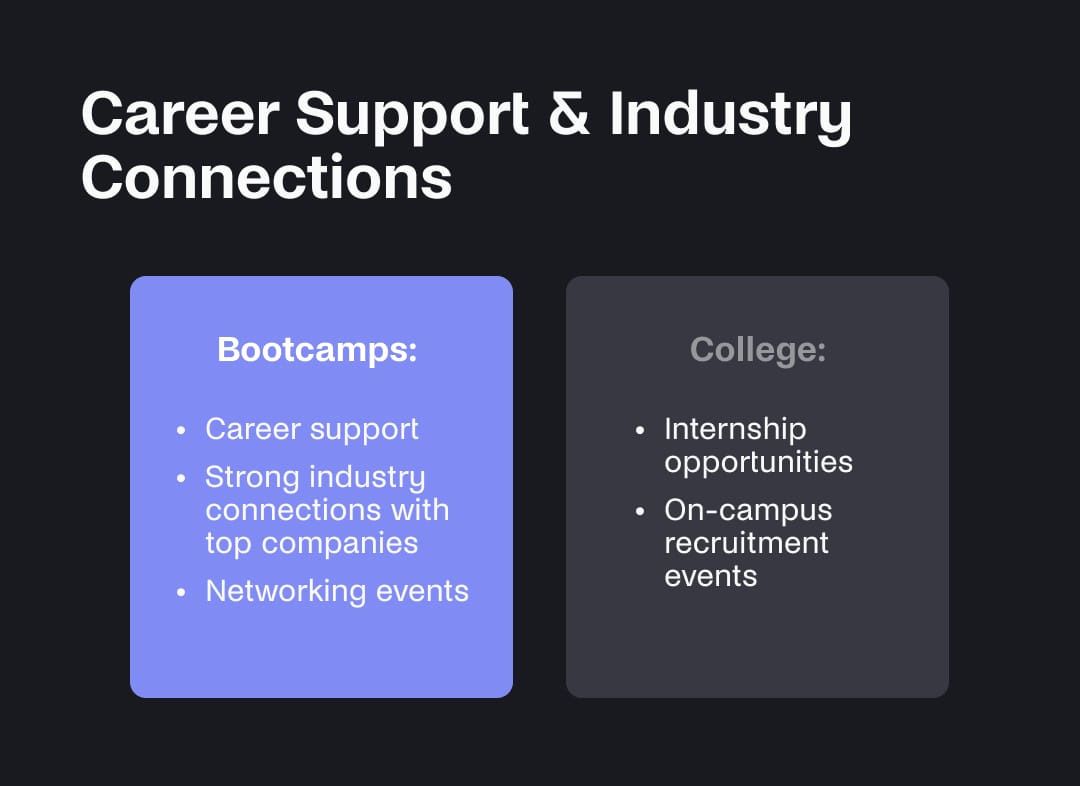
Coding Bootcamps:
Career support is a cornerstone of the bootcamp experience. Programs often include resume workshops, mock interviews, and job placement assistance. Many coding bootcamps also have partnerships with tech companies, creating a direct hiring pipeline for graduates.
Networking is another strength of bootcamps. You'll meet industry professionals, attend job fairs, and join alumni networks. These connections will be invaluable when you start your job search.
Given this support, it's no surprise that outcomes for coding bootcamp graduates are strong. 79% of bootcamp grads land a job, usually within six months. In fact, Turing College graduates have an employment rate of 97.9%!
University Programs:
Universities offer various career services, including counseling, on-campus recruitment events, and internship placements. A university's reputation and alumni network can also play a significant role in job placement. Long-term, a degree from a reputable university can open doors and offer credibility in the job market.
Internships and co-op programs offered through universities provide practical experience and industry connections. However, they may require more proactive effort from the student compared to the structured support in bootcamps.
Comparison:
Both paths offer robust career support but in different formats. Bootcamps provide intensive, immediate job placement services, while universities offer long-term benefits and credibility. Your career goals and preferred support system should guide your choice.
Materials and Feedback
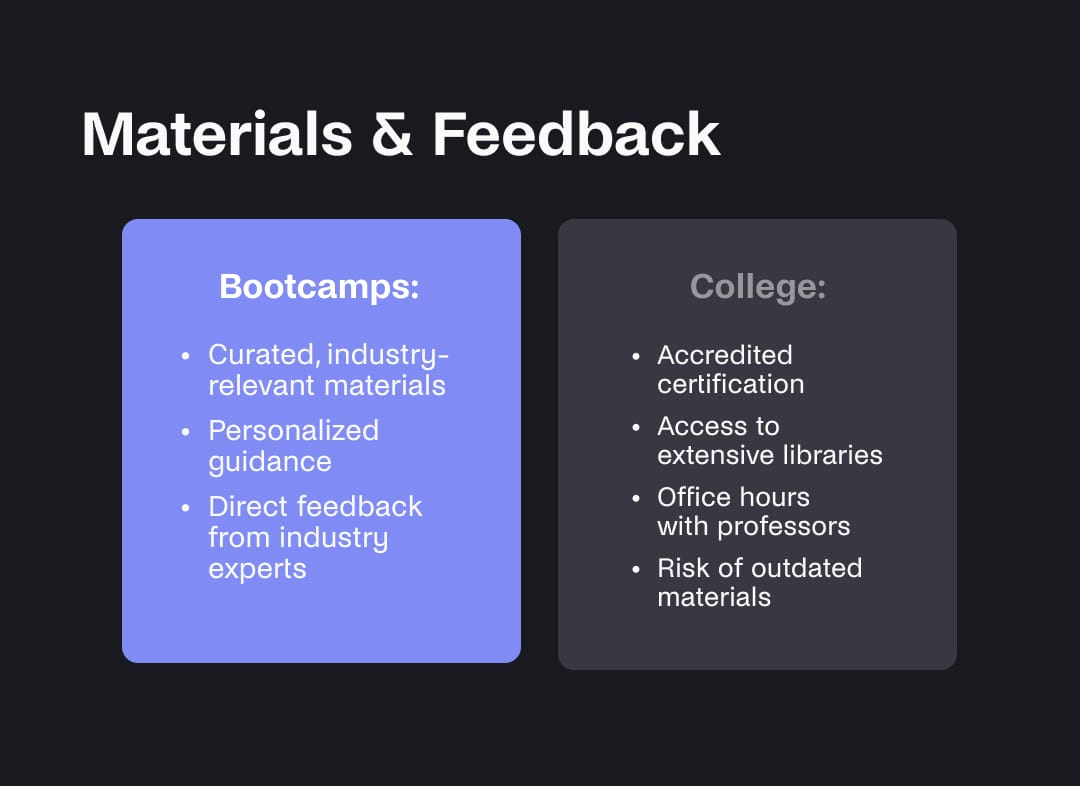
Coding Bootcamps:
Bootcamps prioritize curated, industry-relevant materials. You'll have access to the latest resources and tools, with continuous feedback through projects and assessments. Mentorship from industry experts is a common feature, providing direct feedback and personalized guidance.
The adaptability of bootcamps ensures you're learning the most relevant skills. The feedback loop is faster and more practical, keeping you aligned with industry demands.
University Programs:
Universities offer extensive academic resources, including libraries, research papers, and labs. Feedback comes through formal grading and assessments, and office hours with professors and academic advisors provide structured support. Universities offer accredited certifications upon graduation, which are valuable credentials in the job market.
The rigorous academic environment of universities fosters a deep understanding of concepts. However, it may be less adaptable to rapid technological changes, posing a risk of outdated materials.
Comparison:
The quality and type of learning materials and feedback vary significantly. Bootcamps offer practical, up-to-date materials with rapid feedback from industry experts. Universities provide extensive academic resources with a more structured feedback system and accredited certification. Consider which type of learning environment suits you best.
Community and Cost
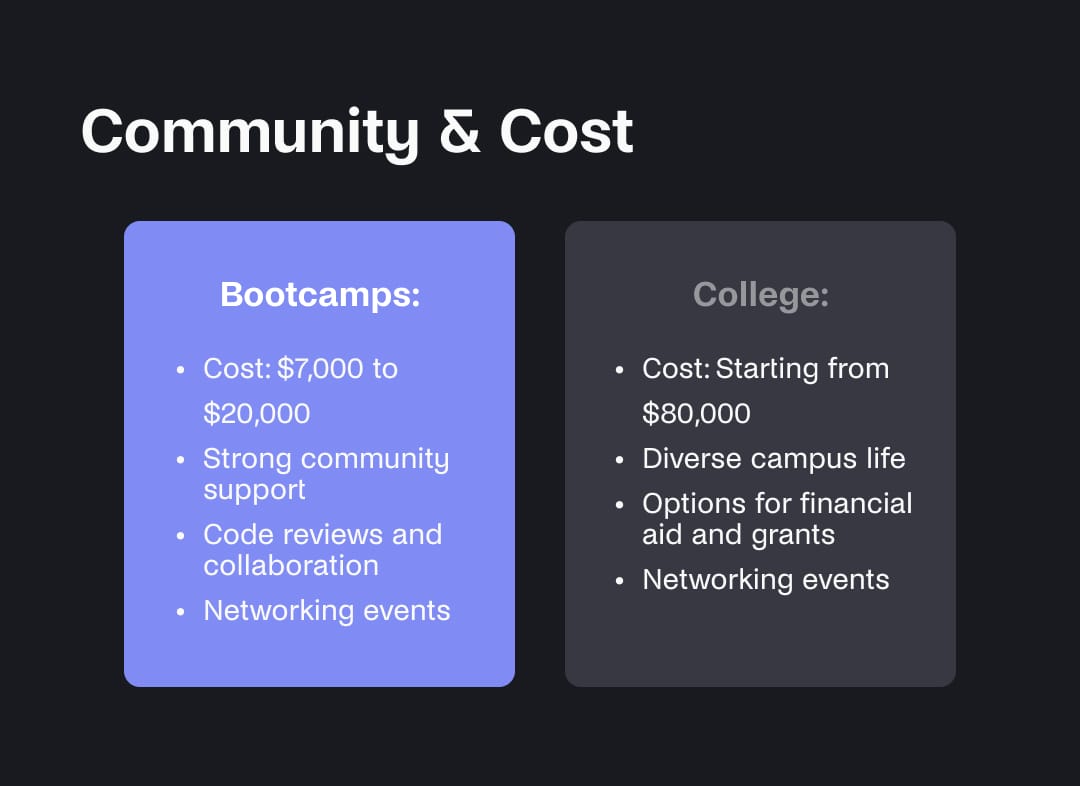
Coding Bootcamps:
Bootcamps foster strong, supportive communities. You'll work closely with peers on collaborative projects, building a network of like-minded people. The sense of camaraderie and support is a strong motivating factor for many.
Many top coding bootcamps cost from $7,000 to $20,000, with an average cost around $14,000. This short-term financial investment can be more manageable and offer a quicker return on investment.
Tip: When considering a coding bootcamp, look for those that offer scholarships, payment plans, or other funding options to help if you can't pay upfront.
University Programs:
Universities offer a rich campus life with clubs, organizations, and events contributing to broader personal and professional development. The sense of community extends beyond academics, providing the unmistakable college experience.
However, college tuition is a lot higher. Degrees, particularly at private institutions, can cost upwards of $150,000. Extra fees for learning materials, living expenses, and potential student debt are also substantial. Scholarships, grants, and financial aid can help reduce these costs, and online computer science degrees may be cheaper. However, the financial commitment is still high and long-lasting.
Comparison:
Both community and cost are crucial factors. The cost of coding bootcamps is lower, and they offer a strong, focused community. Meanwhile, universities provide a broader community experience at a higher financial commitment. Your financial situation and desire for a holistic college experience should guide your decision.
Personal Considerations
Consider how you learn best. If you prefer a fast-paced, hands-on approach, you may enjoy the experience of a bootcamp better. If you value a well-rounded education with opportunities for research, look at traditional four-year colleges – a CS degree may better fit your needs.
Align your educational path with your career aspirations. Think about where you want to be in 20 to 30 – that's just as important to consider as the cost and curriculum. If you aim to become a VP of Engineering at a major company like Apple, you'll need a CS degree. However, if you dream of joining or launching a startup, a coding bootcamp is a much better fit. Startups highly value personal projects and self-taught experience, seeing them as a sign of an entrepreneurial spirit, and more likely to hire a specialist without a degree.
Reflect on your current lifestyle and commitments. Bootcamps demand an intense, short-term effort, while degrees require a longer-term, more balanced approach. Think about how each option fits with your personal and professional life.
Making the Decision
When choosing between a coding bootcamp and a university degree, ask yourself:
- What are my career goals?
- How do I learn best?
- What can I afford in terms of time and money?
- What is my current lifestyle, and how much time can I commit to studying?
For further research, take a look at websites like Course Report and SwitchUp for bootcamp reviews and U.S. News & World Report for college rankings. Books like Gayle Laakmann McDowell's Cracking the Coding Interview and forums like Reddit's r/learnprogramming can also offer valuable insights.
Base your decision on your unique circumstances, career goals, and personal preferences. Both paths offer valuable opportunities and can lead to a successful career in tech.
So Should You Choose a Coding Bootcamp or College?
Choosing between a coding bootcamp and a university degree is a personal decision that depends on your career goals, learning preferences, and life circumstances. Bootcamps offer a fast, flexible, and practical route into the tech industry, ideal for those looking to transition into a job as soon as possible. A bachelor's degree in computer science provides a traditional college experience and a comprehensive, in-depth education for degree holders.
Think about what you value most in your educational journey and career path. Whether you choose a coding bootcamp with its job-focused approach or a university's broad education, remember to always keep learning. Make the choice that aligns best with your aspirations, and start your journey with confidence and motivation.
The Best of Both Worlds
Still unsure which path to choose? The good news is that you don't have to pick just one. Career decisions aren't set in stone. You can pursue both a coding bootcamp and a computer science degree program at different points in your life. These paths offer complementary skill sets and networking opportunities that can enhance your career.
If you already have a degree and have been in the tech industry for years, you may want to enroll in a coding bootcamp to boost your skills. Or, a bootcamp graduate might decide to go to college after gaining some experience. Combining both can help balance out the disadvantages of each. You can even fast-track a degree by getting credit for work experience or earning your degree part-time while working in tech. Instead of choosing between a computer science degree and a coding bootcamp, many find success in combining both.
